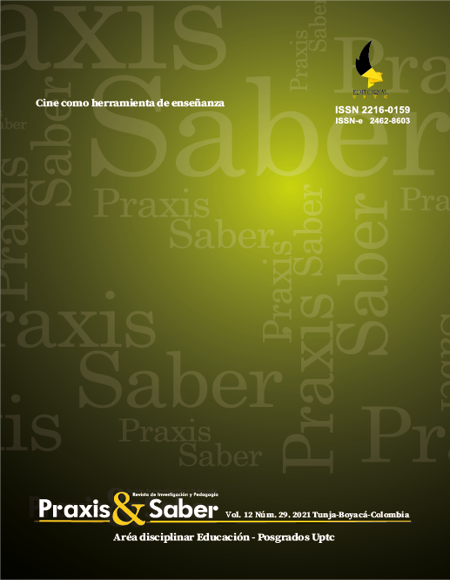The adjustment situated towards an audiovisual work: the sharpening of culturally mediated sensibility

Abstract
The Skillful Intentionality Framework (SIF) is a perspective that allows studying cognition in sociocultural practices. It is an ecological theoretical approach that can be adapted to understand teaching-learning situations. This study aims to achieve an approximation to the SIF of the viewer academically involved with a film work. A virtual ethnographic experience was carried out, in which the written texts of two groups of psychology students academically involved with different study topics were explored. The texts showed how the participants' sensitivity to the observation of the film work is adjusted in the context of educational practice. The ideas of this study may be relevant to design meaningful knowledge construction experiences in the classroom from the interaction with cultural artifacts.
Keywords
ecological psychology, 4E cognition, situated learning, movie film, education
Author Biography
Ana Cristina Santana Espitia
I work as a Professor at the School of Psychology of the Pedagogical and Technological University of Colombia. Doctor in Psychology from the National University of Colombia, in the line of Methods and Instruments for Research in Behavioral Sciences; Magister in Psychology with an emphasis on Methods and Instruments for Research in Behavioral Sciences and psychologist from the National University of Colombia, with knowledge in statistics, research methodology, psychometry, educational evaluation and educational psychology, specifically in the area of school guidance. I also have experience in interpreting the results of national and international external tests for the Ministry of National Education, in university teaching, in the design of evaluation strategies in psychology and education and in the development of institutional programs aimed at improving school coexistence , the promotion of human, sexual and reproductive rights, and the vocational guidance of high school students.
Jesús Armando Fajardo Santamaría
I work as a Research Professor in Social - Community Psychology at the Manuela Beltrán University (UMB). I am a teacher with a degree in Social Sciences graduated from the District University and a psychologist from the National University with a Master's degree in Philosophy from the same university. I finished my Ph.D. in Philosophy at the National University of Colombia. My work emphasis is the philosophy of psychology, focused on the analysis of social interaction in the formation of thought. I have more than 10 years of work experience in the official educational sector, I also have experience in university teaching, in quantitative and qualitative methodology, construction of psychological tests and psychometric analysis of assessment instruments in psychology and education.
References
Armstrong, J. (2016). Coordination, triangulation, and language use. Inquiry, 59(1), 80-112.
https://doi.org/10.1080/0020174X.2015.1115270
Davidson, D. (2001). The Emergence of Thought. En D. Davidson (Ed.), Subjective, Intersubjective, Objective (pp. 123-134). Oxford University Press.
Dombroski, K. (2018). Learning to be affected: Maternal connection, intuition and “elimination communication”. Emotion, Space and Society, 26, 72-79. https://doi.org/10.1016/j.emospa.2017.09.004
Duguid, S., Wyman, E., Grueneisen. S., & Tomasello, M. (2020). The strategies used by chimpanzees (Pan troglodytes) and children (Homo sapiens) to solve a simple coordination problem. Journal of Comparative Psychology, 134(4), 401-411. https://doi.org/10.1037/com0000220
Gallagher, S. (2017). Theory, practice and performance. Connection Science, 29(1), 106-118. https://doi.org/10.1080/09540091.2016.1272098
Garton, A. (1994). Interacción social y desarrollo del lenguaje y la cognición. Paidós Ibérica.
Gibson, J. (1979). The ecological approach to visual perception. Psychology Press.
Heft, H. (2013). Environment, cognition, and culture: Reconsidering the cognitive map. Journal of Environmental Psychology, 33, 14-25. https://doi.org/10.1016/j.jenvp.2012.09.002
Heras-Escribano, M., & Pinedo de-García, M. (2018). Affordances and landscapes: Overcoming the nature-culture dichotomy through Niche Construction Theory.
Frontiers in Psychology, 8(2294), 1-15. https://doi.org/10.3389/fpsyg.2017.02294
Korsakova-Kreyn, M. (2018). Two-level model of embodied cognition in music. Psychomusicology: Music, Mind, and Brain, 28(4), 240-259. https://doi.org/10.1037/pmu0000228
Kozulin, A. (2000). Instrumentos psicológicos. La educación desde una perspectiva sociocultural. Paidós Ibérica.
Krueger, J. (2011). Extended cognition and the space of social interaction. Consciousness
and Cognition, 20(3), 643-657. https://doi.org/10.1016/j.concog.2010.09.022
Lebois, L., Wilson-Mendenhall, C., Simmons, W., Barrett, L., & Barsalou, L. (2020). Learning situated emotions. Neuropsychologia, 145, 106637. https://doi.org/10.1016/j. neuropsychologia.2018.01.008
López-Silva, P. (2020). Organismo y acción situada: mapeando el concepto de affordance. Avances en Psicología Latinoamericana, 38(1), 1-15. https://doi.org/10.12804/revistas.urosario.edu.co/apl/a.7475
Melfi, T. (Director). (2016). Hidden Figures [Película]. 20th Century Fox; Chernin Entertainment; Donna Gigliotti; TSG Entertainment.
Newen, A., Gallagher, S., & Bruin de, L. (2018). 4E Cognition: Historical roots, key concepts, and central issues. En A. Newen., L. De Bruin, & S. Gallagher (Eds.), The Oxford Handbook of 4E Cognition (pp 3-15). Oxford University Press.
Pagin, P. (2001). Semantic Triangulation. En P. Kotatko, P. Pagin, & G. Segal (Eds.), Interpreting Davidson (pp. 199-212). CSLI Publications
Radford, L. (2017). Saber y conocimiento desde la perspectiva de la Teoría de la Objetivación. En B. D’Amore, & L. Radford (Eds.), Enseñanza y aprendizaje de las matemáticas: Problemas semióticos, epistemológicos y didácticos (pp. 97-114). Universidad Distrital Francisco José de Caldas, Doctorado Interinstitucional en Educación. https://bit.ly/2XdYJrk
Rietveld, E. (2008). Situated normativity: The normative aspect of embodied cognition in unreflective action. Mind, 117(468), 973-1001. https://doi.org/10.1093/mind/fzn050
Rietveld, E., Denys, D., & Westen van, M. (2018). Ecological-Enactive Cognition as engaging with a field of relevant affordances: The Skilled Intentionality Framework (SIF). En A. Newen., L. Bruin de & S. Gallagher (Eds.), The Oxford Handbook of 4E Cognition (pp 40- 70). Oxford University Press. https://doi.org/10.1093/oxfordhb/9780198735410.013.3
Rietveld, E., & Kiverstein, J. (2014). A rich landscape of affordances. Ecological Psychology, 26(4), 325-352. https://doi.org/10.1080/10407413.2014.958035
Rogoff, B., & Chavajay, P. (1995). What’s become of research on the cultural basis of cognitive development? American Psychologist, 50(10), 859-877. https://doi.org/10.1037/0003-066X.50.10.859
Saarinen, J. (2020). What can the concept of affective scaffolding do for us? Philosophical Psychology, 33(6), 820-839. https://doi.org/10.1080/09515089.2020.1761542
Urbina, J. (2011). Etnografía virtual. En P. Páramo (Ed.), La investigación en ciencias sociales: estrategias de investigación (pp. 169-178). Universidad Piloto de Colombia.
